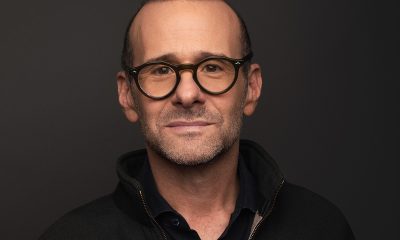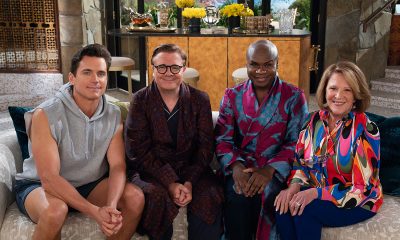Arts & Entertainment
Jack discovers Grindr in new ‘Will & Grace’ promo
the series premiere is on Sept. 28
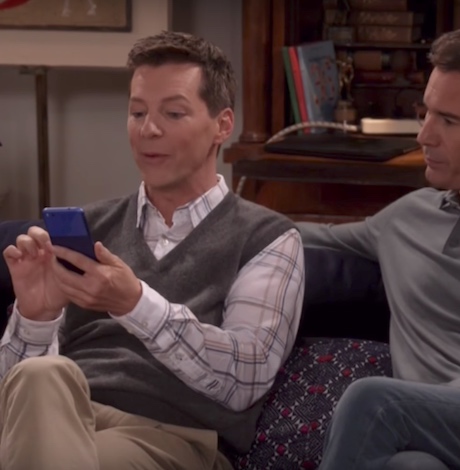
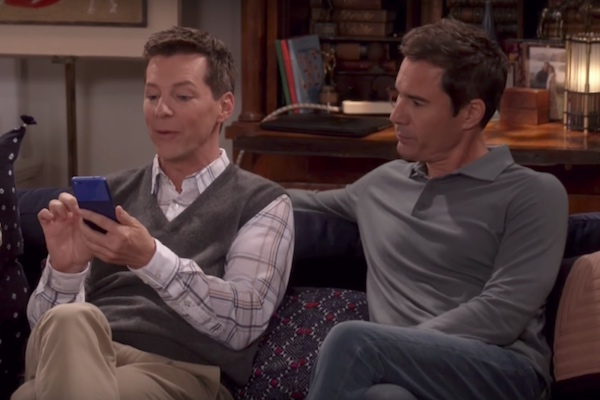
(Screenshot via YouTube.)
Jack delves into the digital age of gay hookups on Grindr in a new clip for the upcoming season of “Will & Grace.”
The promo starts featuring old school clips of the gang and their antics before giving a sneak peek at the foursome set in modern day using new technology.
Will (Eric McCormack) and Grace (Debra Messing) participate in a game of Heads Up where Will gives the clue, “Okay, he’s a man, but he’s aged into a lesbian.”
“Newt Gingrich,” Grace yells.
In another clip, Jack (Sean Hayes) swipes through his Grindr options.
“Grindr has gotten so skanky,” Jack says. “I feel like I could get finger herpes just from scrolling.”
He then gets excited that there’s a gay man near him, only to discover it’s Will sitting on the couch next to him.
“Will & Grace” premieres on Thursday, Sept. 28 at 9 p.m. on NBC.
Events
The Los Angeles Blade Partners with AJSOCAL to host gala uplifting AAPI joy and resistance
AJSOCAL is hosting its annual gala at the Westin Bonaventure Hotel on Thursday, October 16th; Los Angeles Blade serves as Gala Media Partner.
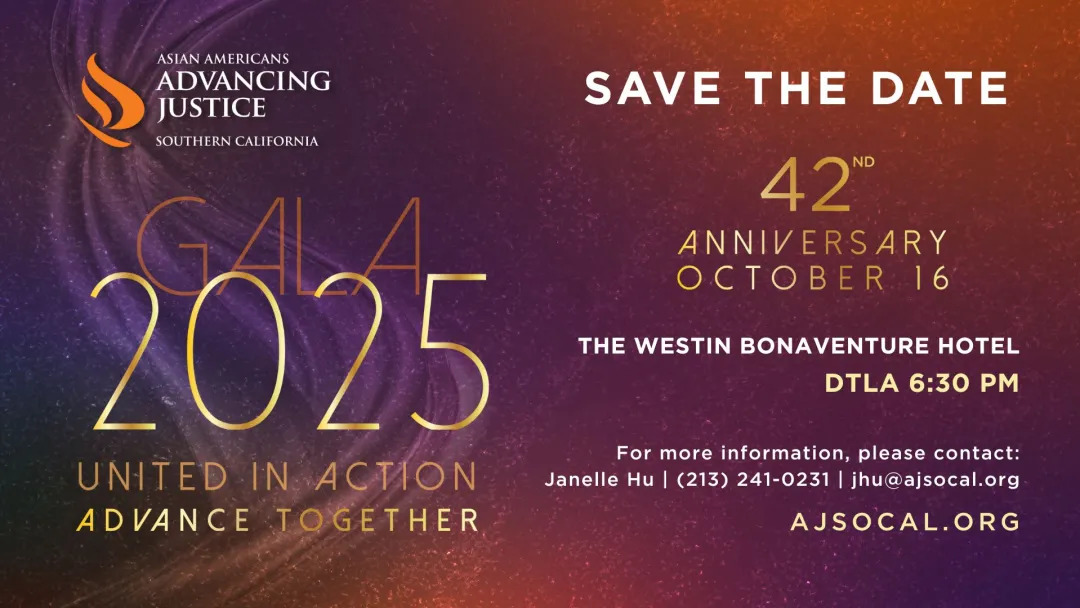
This year, Asian Americans Advancing Justice Southern California (AJSOCAL), a leading legal and civil rights organization that fights for policies defending Asian American and Pacific Islander community members, is hosting its annual gala at the Westin Bonaventure Hotel on Thursday, October 16th. The Los Angeles Blade serves as the organization’s 2025 Gala Media Partner, spotlighting feature issues on two LGBTQ+ policy advocates who have spearheaded the organization’s AAPI Queer Joy coalition as well as one of the event’s honorees, first-time Los Angeles City councilmember Ysabel Jurado.
A special edition run of these features, as well as other Los Angeles Blade stories, will be available at the gala. Other honorees and special guests at this year’s event include Bird Marella’s managing partner, Paul Chan, Pasadena Fire Department fire engineer Chien Yu, former Biden cabinet secretary Julie Su, and others. The gala will be hosted by anchor and broadcast journalist David Ono and will feature a performance by local band Kokoro.
L.A. City Councilmember Ysabel Jurado will be presented with the 2025 Trailblazer in Justice Award, celebrating those who break barriers, open doors, and pave new paths, by the Los Angeles Blade and AJSOCAL.
More information can be found here.
WHERE: The Westin Bonaventure Hotel – Downtown LA
404 S Figueroa Street
Los Angeles, CA 90071
WHEN: Thursday, October 16
4:30 pm Media Check-in
5:15 pm Red Carpet Opens
6:30 pm Event Begins
6:45-9:00 pm Program and Dancing
Asian Americans Advancing Justice Southern California (AJSOCAL) is the nation’s largest legal and civil rights organization for Asian Americans and Pacific Islanders (AAPIs). Founded in 1983, AJSOCAL supports over 15,000 individuals and organizations annually. By offering free legal help, engaging in impact litigation, conducting crucial research, and advocating for policy change, AJSOCAL prioritizes the most vulnerable members of AAPI communities while fostering a robust advocacy for civil rights and social justice. Offices are in downtown Los Angeles and Orange County, with satellite offices in Sacramento, ensuring accessibility for
all.
Events
“We are glimmers of hope”: LGBTQ+ advocates deliver powerful speeches defending queer rights at Equality Awards
The 2025 Equality Awards honorees were Fran Drescher and the Coalition for Humane Immigrant Rights
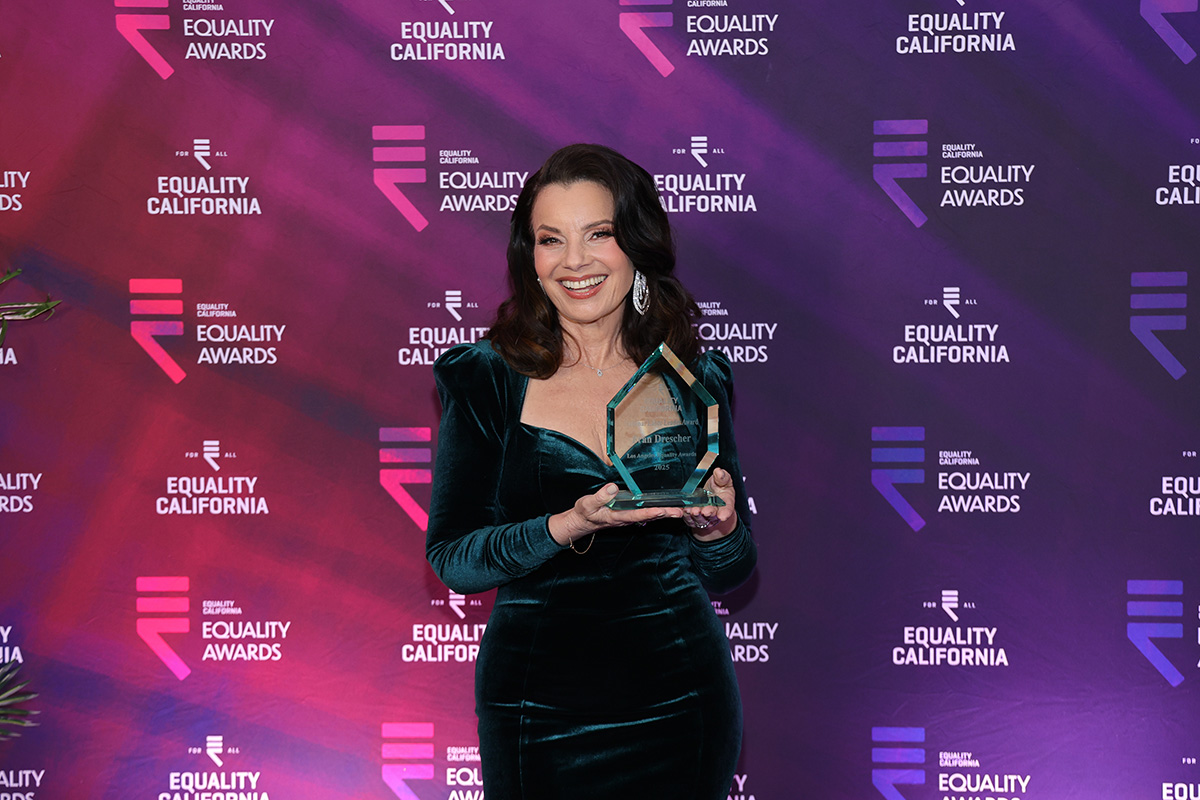
On Saturday evening, nearly 700 people packed the lower-level ballroom of the lavish Fairmont Century Plaza hotel for LGBTQ+ civil rights organization Equality California’s annual awards ceremony. Throughout the night, several speakers took passionate stands on the urgent and unequivocal need, now more than ever, to support queer communities and the organizations working to protect their rights and liberties. Senator Lena Gonzalez and Assemblymember Mark Gonzalez, two of the event’s co-chairs, encouraged attendees to create a direct impact by making donations. The goal for the evening was $125,000.
As soft pink light and the clinking of cutlery at dinnertime enveloped the room, host Bob the Drag Queen wove lightness and humor in between speeches with his signature biting humor and commanding stage presence. “I do a lot of galas, so sometimes they kind of bleed together,” he told the Blade. “But it’s never lost to me: the work that is being done at these things and the people whose lives are being helped. Sometimes it’s easy to get lost in the rigmarole of, ‘Oh, another gala. More rich people giving money.’ But then that money does end up going somewhere and doing something really substantial.”
Around half an hour into the program, Equality California’s executive director, Tony Hoang, delivered, without hesitation, a promise that the organization is dedicated to resisting and unraveling the harm of the administration’s threats to policies and programs that support queer and trans youth, immigrants, and other community members. “The courts will not save us. Congress will not save us. What will save us is sustained organizing, day in and day out,” Hoang said. “While they’re trying to silence us, this is the moment to double down, to share your story, to invest your time, to invest your resources.”
Comedian and radio host Jesse Thorn also took the stage to speak candidly about raising trans kids and how exhausting this last year has been. When his first child came out as trans almost ten years ago, he feared for her safety, but was introduced to various resources, support groups, and care options that gave him hope as a parent. “It felt like we were on a steady path to safety,” he said. “I only wish that I still had that safe, optimistic feeling. Right now, I just feel sick to my stomach.”
Thorn recounted trying to shield one of his children from a transphobic commercial that came on during a 49ers game he’d been watching, and how, more recently, he was told that the clinic that provided gender-affirming care to his children was shuttering. “Do we fight? Do we run away and hide? Are we traumatizing our kids if they know the stakes?” he said. “If we reply to someone’s post on Facebook with the name of our new doctor, will someone turn them into the feds?”
While it feels like he and his wife have had to make a new call every day to recalculate next steps for their family, he finds comfort in thinking about queer and trans family members, friends, and elders who resisted systemic violence and fought for their right to stability, equality, and happiness. “[I] think of all these people that gave so much of themselves to live a joyful life,” Thorn told the Blade. “It’s the readiness, the lack of hesitance that I have felt from not just the queer community more broadly, but particularly those earlier generations. They see the analogy is direct, and they’re fighting.”
Other notable speeches of the night included one of the evening’s two honorees: actress, former SAG-AFTRA union president, and 90’s sitcom icon Fran Drescher. As she shimmied onto the stage with a wide smile to accept the National Labor Leader Award, she cracked jokes before honing in on the importance of defending the lives of marginalized people. She spoke about the successful strikes she led at SAG-AFTRA, which led to historic negotiation deals in favor of the union’s workers, as well as her own battles with misogyny as she took on leadership roles later in her career. “I can lead with intellect and empathy and wisdom — and I can still rock a red lip!” she declared.
“As members of a labor union or citizens of a nation, it behooves us all to resist these manipulations, to make kindness and compassion our compass, to remain stalwart in our unity above all else,” Drescher concluded. “I’ll just close by saying this: love is love. Thank you.”
The other honoree of the evening was the Coalition of Humane Immigrant Rights (CHIRLA), an organization that has been paving the way in developing programs, initiatives, and rallies to advance civil rights for immigrant communities. CHIRLA’s executive director, Angelica Salas, who has led the group for over 20 years, accepted the ceremony’s Community Leadership Award and addressed the crowd with empowering remarks.
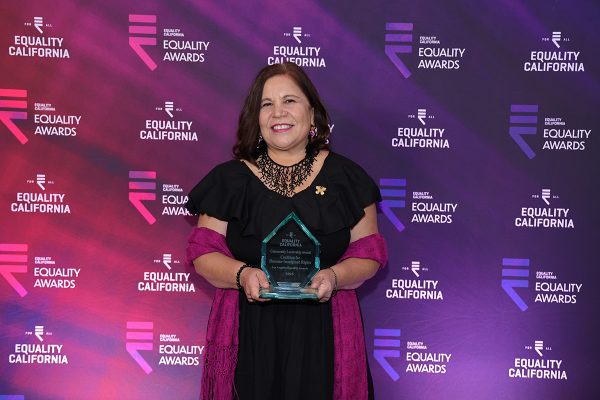
Off the heels of a march protesting the administration’s executive orders, which have authorized unjust arrests and detainments of immigrants, Salas was clear in her criticisms and calls to action. “We want ICE out of our schools. [We want] ICE out of our clinics and hospitals,” Salas said. “Like it or not, our LGBTQ+ Americans and immigrants make this country more beautiful, more powerful, and more united…We are rainbows, we are color, we are glimmers of hope…Equality California, we got your back, and I know you got our back. So, let’s fight together.”
As the night wound to an end, several items were fought over during an energetic live auction, including vacation getaways to Paris and Puerto Vallarta, a Sabrina Carpenter concert experience, and memorabilia associated with late activist Marsha P. Johnson. By 9:30 p.m., the $125,000 donation goal was achieved and even surpassed by over $5,000.
Movies
Intensive ‘Riefenstahl’ doc dives deep into a life of denial
German filmmaker spent decades trying to rehab her image
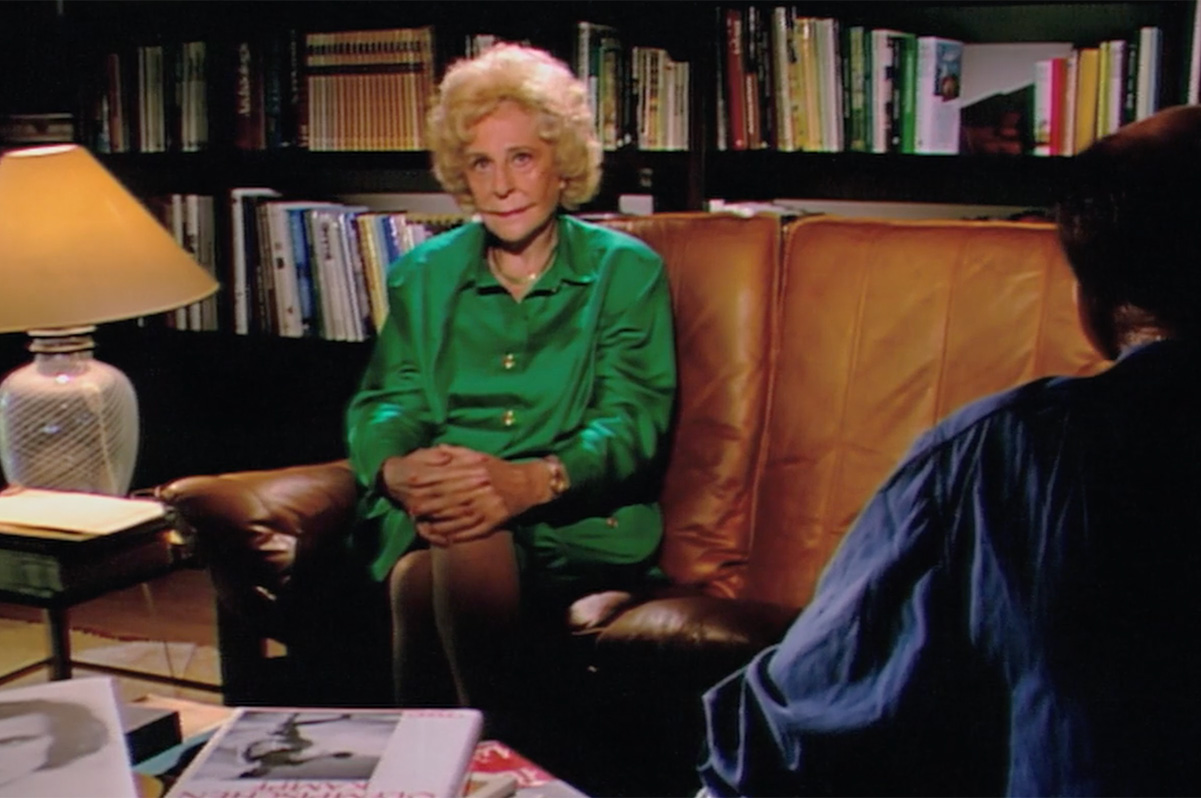
She was an exceptional woman of the early 20th century, an ambitious powerhouse with beauty, intelligence, and a bold creative vision, along with a determination for success that helped her become a pioneering female artist. She rose to prominence as a dancer, actress, photographer, and filmmaker who helped to define the aesthetic of an era, and reached the top of her profession in a male-controlled industry. Her career was relatively short, but her life was long enough to see her movies held up as cinema masterworks, studied by filmmakers and scholars for their blend of technical prowess and poetic vision, before eventually dying at the impressive age of 101 in 2003.
Yet today, you’d be hard-pressed to find anyone eager to celebrate her legacy with anything more than carefully calculated appreciation.
That’s because her name was Leni Riefenstahl, and her filmmaking career ended prematurely not in retirement, nor from illness, nor even because of some scandalous gossip-column tale of adultery or sexual deviance. It ended because she built it in Germany, collaborating with Hitler and hob-nobbing with a who’s-who of infamous Nazis while enthusiastically creating spectacular documentaries that implicitly promoted a romanticized vision of the Third Reich. Her celebrated films were tarnished at the end of the war, their artistic merit eclipsed by the circumstances under which she had made them, and she spent much of the rest of her life as a relative pariah.
Indeed, as the cinema buffs out there probably already know, her name became practically synonymous with the idea of an artist whose work cannot be separated from their “problematic” ethical choices or political views; and while she would resurface when her films found muted-but-sincere appreciation from a new generation of critics, participating in interviews or appearing on the occasional talk show, she would spend the rest of her long life trying desperately to rehabilitate her image and her reputation in the public eye. Yet however often she repeated her claims – that she had never believed in the ideals of the Nazi movement, that she was never aware of the atrocities that took place under Hitler’s reign, that she had always only been motivated by “art” – most of the world seemed to never quite believe them.
Now, with an exceptionally comprehensive documentary from director Andres Veiel, Riefenstahl’s culpability in the Holocaust is up for examination again, and the timing couldn’t be any more perfect.
Granted unlimited access to Riefenstahl’s personal archives by her estate, Veiel draws deeply from the rich collection of imagery, writings, and artifacts contained there to assemble a measured and methodical portrait that is largely drawn from her own words and the pictographic record she chose to keep as part of her official legacy. Tracing her from her upbringing as the child of a stern authoritarian father and a mother who pushed her aggressively to succeed, it follows her rise in the German movie industry, where she gained fame as an actress before making her own first film as a director – “The Blue Light” (1932), a successful debut that caught the attention of Germany’s future führer, eventually leading to her first commission as a filmmaker for the Nazi government.
It goes on to examine the records of her associations with the Nazis during the wartime years, including an implied affair with Joseph Goebbels and an eventual marriage to a leading Wehrmacht officer, as well as a friendship with Nazi architect Albert Speer that would endure beyond his 20-year post-war prison sentence. Even more provocative, it explores her participation in the filming of location scenes for a propaganda film that used child inmates from a nearby concentration camp as extras – something that casts her claimed ignorance of the Nazi agenda in an even less convincing light.
It also utilizes the copious material that documents her lesser-known history after the war, during which she undertook the writing of her memoirs and returned – briefly – to the limelight with an extensive photographic study of the Nuba tribes of Sudan. But it’s her frustrated attempts to escape the stain of her past that provides the recurring theme for this portion of her life, punctuated by footage of her confrontations with interviewers, talk show hosts, and documentarians who asked her the questions she didn’t want to answer. In these moments, we can witness her unfiltered; we take note of her imperious manner and her quick temper, of the vanity which shows through her demands over lighting and makeup, and of the tongue-slips that inadvertently offer a glimpse at something we suspect she’d rather we didn’t see.
Veiel organizes all this information in a sort of kaleidoscopic narrative in which the various periods of his subject’s life bleed across and into each other, forming recognizable patterns which acknowledge and revel in her singular artistic vision, yet come to form an inescapably damning assessment of her long-held denials; though there’s no “smoking gun” that proves her unequivocally to be a liar, there are far too many of those “tongue-slips” to ignore. In the end, it leaves us with the inescapable conclusion that Leni Riefenstahl, whether she believed in the party agenda or not, was willing – at best – to overlook Hitler’s monstrous crimes against humanity for the sake of her own ambitions; even more, it suggests that the only thing she regretted afterward was the loss of her career and the stigma that was steeped upon her. In the end, it’s hard to avoid the conclusion that she, like so many Germans of the Nazi era, wanted to simply pretend they didn’t know what was happening, when they were tacitly condoning it every step of the way.
With its leisurely pace and its brooding, minimalistic score by Freya Arde, “Riefenstahl” weaves a hypnotic effect that makes its two-hour runtime drift by like a dream, but there’s a meticulous logic and a rigorous empiricism to it all – marked by a sparseness of narration from its director, who merely supplies essential context to material he allows to speak for itself – that crystalizes the facts in way that’s entirely rational, and leaves us with an ominous feeling of familiarity with the world in which its controversial subject made her contribution to cinematic history; it’s this which renders Veiel’s documentary with such a profound sense of relevance, an ominous feeling of déjà vu that might be best illuminated through Riefenstahl’s own words from the final recorded conversation included in the film, in which she predicts that it will take “one or two generations” for Germany to reawaken to the “morality, decency, and virtue” to which its people are “predestined.”
Doing the math, her calculations feel chillingly accurate, though perhaps the spirit that has reawakened has more to do with a particular worldview than a specific national identity.
“Riefenstahl” premiered at the Venice film festival in 2024, with an American debut at Telluride earlier this year. Released in New York and screening at venues across the U.S. and Canada this fall, it’s a movie to watch for. Set your radar accordingly.
Books
These four intertwined stories will leave you flabbergasted
Characters in ‘The Elements’ wrestle with culpability and the past
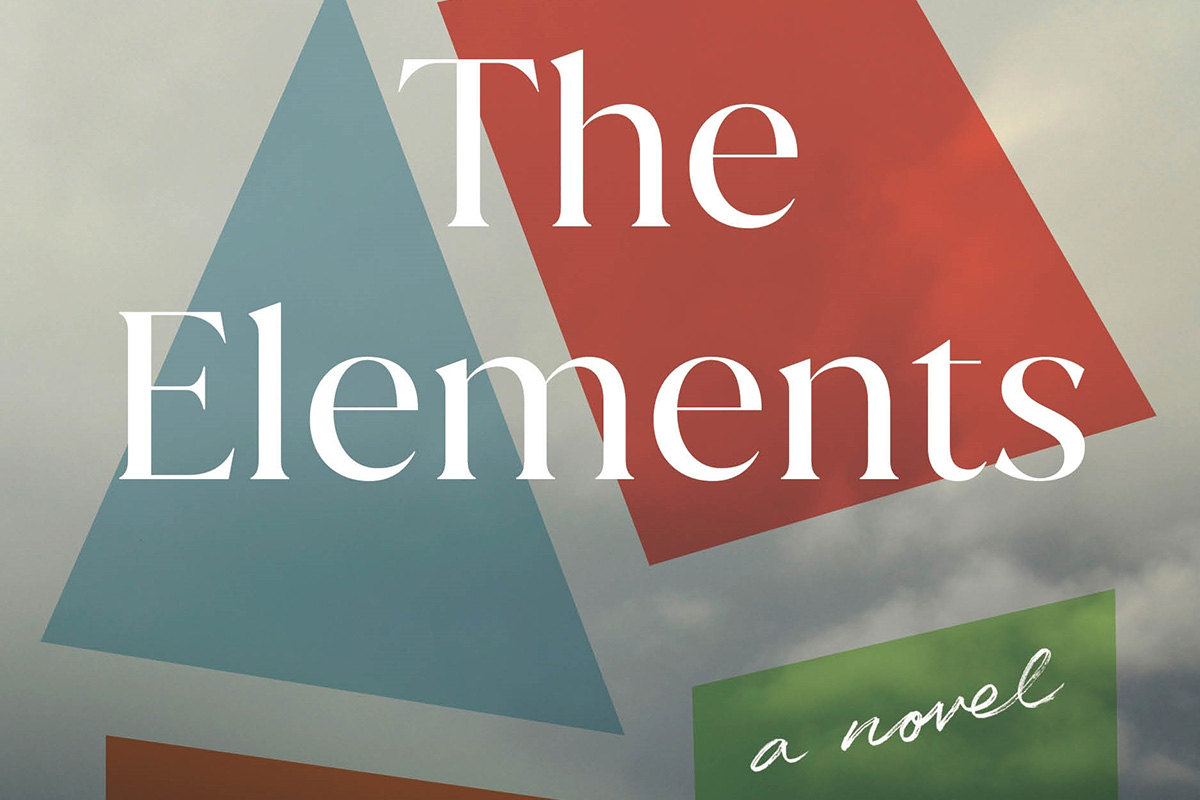
‘The Elements’
By John Boyne
c.2025, Henry Holt
$29.99/496 pages
You weren’t proud of it.
Something you did in your past, yesterday, five years ago, a lifetime, you think of it sometimes and poke it like a bad tooth. You’re not proud of it but you paid for it anyhow, with time, money, apologies, or through a jury of your peers and you know this: as in the new novel, “The Elements” by John Boyne, the condemnation is harshest when the jury is you.

She changed her name again.
It was the first thing Willow Hale did when she rented the cottage on an island not far from Dublin. Isolation would help her sort things out: to figure out why her husband was in jail, why her daughter avoided her. Willow didn’t want anyone to recognize her as she came to terms with her role in what happened.
Though he was born with the skills of an athlete, Evan Keogh didn’t want to be a soccer star. He wanted to be an artist after he left the island, but he wasn’t talented enough. Coming to terms with that took a while, and he sold his body to older men to get by in the meantime. When he finally accepted his athleticism, it was not because he loved the game. It was because he loved revenge but satisfying that itch would ruin his life.
Medical students were annoyances that Freya Petrus had to endure.
Though she was a highly regarded burn surgeon, the truth was that she disliked humanity in general, perhaps because of childhood trauma she couldn’t forget. So, teeth gritted, no family, no friends, no close colleagues, she endured people, relying instead on a sordid hobby to soothe her memories.
Rebecca didn’t ask Aaron Umber to bring their son from Australia to Ireland, but there was a reason he did so, though Emmet balked at the trip. Emmet was at a tender age, not an adult but not a child anymore, either – 14, the same age as when something happened to Aaron that affected him forever.
Where to begin?
How about: “The Elements” is an incredible book.
How about from the very beginning of it, you’ll be captured by what feels like “The Twilight Zone” without the paranormal; like reading the news, and wincing.
Here, the lush Irish background that author John Boyne so lovingly portrays is secondary to his characters, each of them flawed, maybe irretrievably so, as they wrestle with culpability and self-indulgent recognition of the past. You’ll dangle from a string as four intertwined tales eke out in a delicious tease, detonating a little TNT on a page every now and then to keep you on the edge of your chair.
No spoilers here but the end of these four stories isn’t quite really an end, which will leave you flabbergasted, staring at the back cover for a few minutes after you close it.
Beware that there are adult themes inside this book, and they could be triggering. If that’s not a worry, let yourself be stunned by “The Elements.”
Love it? Guilty.
The Blade may receive commissions from qualifying purchases made via this post.
a&e features
Sitting Down with Mariachi Arcoiris, Los Angeles’ only LGBTQ+ mariachi
This historic group breaks down their music and how they stay hopeful during such uncertain times.
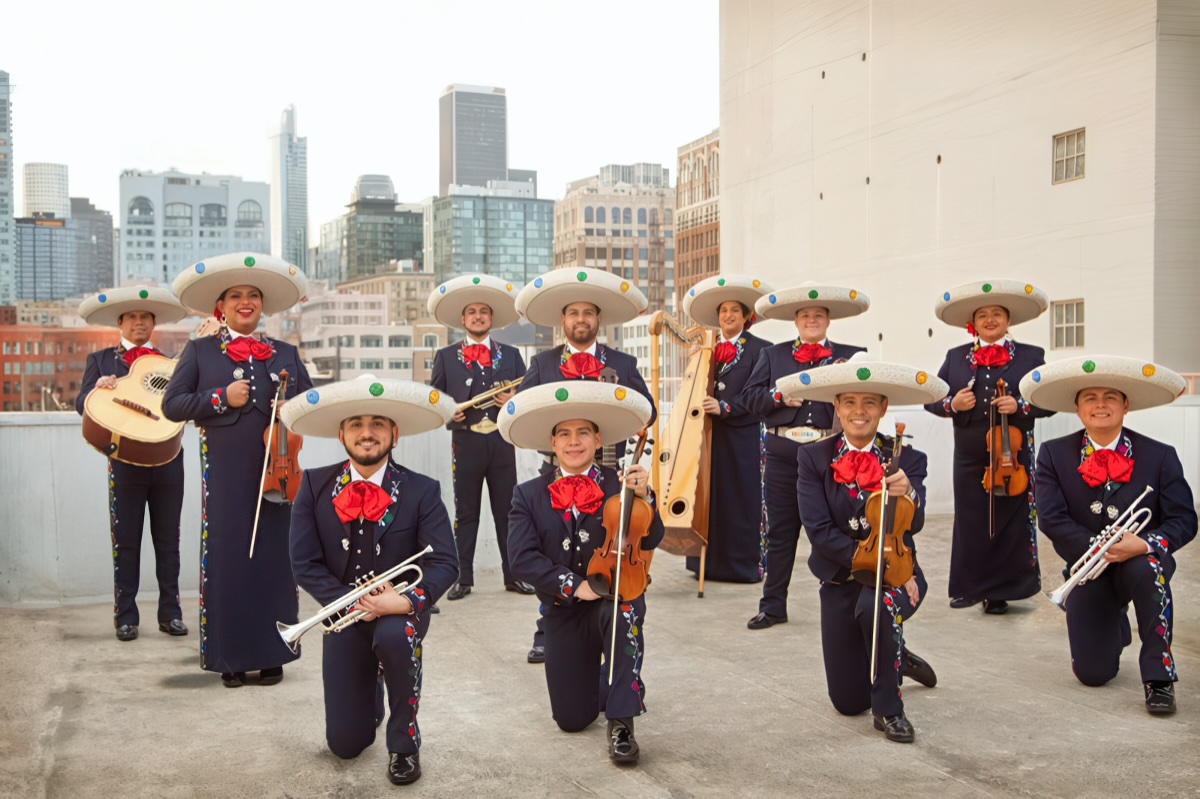
Few things in this world are as powerful as a song.
For centuries, marginalized communities have used music as a way to come together, as a rallying cry to remember the power they hold against those who’d oppress them. And in a Los Angeles filled with music, few groups resound as loudly as Mariachi Arcoiris.
Composed of passionate violins, bellowing trumpets, and amazingly flamboyant uniforms, mariachi encapsulates the complexities of Latine music and the strength of this community. It unfortunately hasn’t always been welcoming to queer performers, but recent years have seen artists merge their identities to create a beautifully intersectional sound. Arcoiris is one of these; this group made history 11 years ago when it was formed as the world’s first all-queer mariachi band. In the time since they’ve inspired thousands, not only gaining fame through their endlessly viral performances but soothing generational wounds with their sound…and it’s been devastating to watch them struggle, along with all of LA’s Latine community, amidst violent ICE Raids and national discrimination.
The Los Angeles Blade was honored to sit down with members of Mariachi Arcoiris to hear about the impact of their music and what it’s been like watching their identities be targeted. They detail how horrible it’s been seeing LA come under attack in recent months — but also how they haven’t lost hope. Because, as any good mariachi will tell you: music heals. And Mariachi Arcoiris hopes that their songs can be the soundtrack to Los Angeles fighting back against those hurting it today.
“I thought to myself, ‘That’s it. I’ve had it — I’m going to start a mariachi where people like me can be welcomed,” Said Carlos Samaniego, who founded Mariachi Arcoiris in 2014. He explained how this group was created in response to homophobia; he’d previously left numerous other mariachis after facing prejudice due to his sexuality. Refusing to allow antiquated ideals to halt his dreams, he founded this group to create a haven for other musicians who’d been refused the spotlight they deserved.
Musicians like Samantha ‘Sammi’ Bautista, who traveled across California to audition for the group the moment she turned 18. She explained what many called a rash move, saying, “It had been a dream of mine…being gay openly, playing along with people in my community. It’s very powerful, [being] ourselves with each other and [creating] this music.” And it’s powerful to watch as well; along with an interview, the Los Angeles Blade was welcomed to sit in on Mariachi Arcoiris’ practice — one of the many they conduct each week. It was an uplifting experience to see a group that encompasses so many identities being used as political fodder come together in laughter and heartfelt performance. Evident in every moment was how much these performers care for one another, with member Yalitza ‘Yaya’ Vasquez-Lopez saying, “This is where we can always come back to and forget about everything else happening in the world.”
It’s a kind of reprieve that Mariachi Arcoiris hopes to give its audience. “We’re really just activating something powerful within us and within our people,” continued Yaya. “And I think that that is resistance in itself, because [when] you start singing along to a song, you [realize]: I’m not alone.” It quickly became clear that this was the mission of Mariachi Arcoiris, to encourage others to live as openly as these musicians do onstage — an openness that, unfortunately, many Angelinos currently view as dangerous.
It’s difficult to describe the gut-wrenching anxiety that has filled LA in previous months. The city has become a hotbed of ICE Raids and the focus of national racism, with each day bringing new stories of hardworking individuals being kidnapped and denied their rights. It’s made many Latine communities reluctant to show pride for their culture in fear of it making them a target. And not only have these attacks affected the city’s residents on a personal level, but as Carlos stresses, on a professional one as well.
“The majority of my musicians do this for a living,” said the founder. “This is how they pay their rent, their food, their gas — everything. Because of the ICE raids, there have been many cancellations of performances.” He emphasized it’s not just them; mariachis across the city have found themselves struggling financially as institutions grow fearful of hosting such a bold example of culture. And not only is their race being targeted, but Mariachi Arcoiris is made up of queer and trans individuals, identities that face more and more attacks from politicians determined to paint their authenticity as something insidious. They’ve found themselves as intersectional targets, enduring a hateful climate that has caused so many people to give up hope…
So why hasn’t Mariachi Arcoiris?
“It hasn’t affected us morally at all,” clarified Yaya, when asked how these attacks have impacted the group’s willingness to perform. “[We are] a chosen family, and it’s brought us closer together to just know that this is where we belong.” The members expressed how they are constantly doing their best to protect one another — and it doesn’t stop with the group. Sammi described how Arcoiris has joined many other mariachi groups in consistently appearing at ICE protests and political demonstrations across LA. They do this all while still loudly broadcasting their queer and trans identities, knowing that the representation their group was founded upon is more important now than ever. This is not to say they’re immune to worry; each member held (utterly justified) concerns around their rights and freedoms. But Yaya reassures that it’s their shared love of the artform — and one another — that keeps them going, saying, “Mariachi is joy, pain, sadness…but also celebration and resistance. Especially today, especially in the US, that’s what mariachi is.”
In a Los Angeles mired in fearful uncertainty, Mariachi Arcoiris is committed to remaining a mainstay of both LGBTQ+ and Latine culture. The group recognizes their future is uncertain; they are still facing reduced performance requests, and each day brings more news of attacks on their communities. Yet they know that music is their best form of resistance, that the melodies they bring to thousands are a reminder of the power we have when we stand together, unafraid to show our most authentic selves. They find solace in this liberating sound, creating it daily to empower not only each other but their countless fans worldwide.
And they want every listener to remember that, if they ever feel alone or like they’ve lost their community, all they have to do is sing along.
Tarot Readings and Astrology
Intuitive Shana ushers in spooky season and the time when Spirit is speaking to us in October’s tarot reading
Some of you may be feeling the spooky vibes in the October air and want to get more in touch with your spiritual side. You don’t have to look that far.
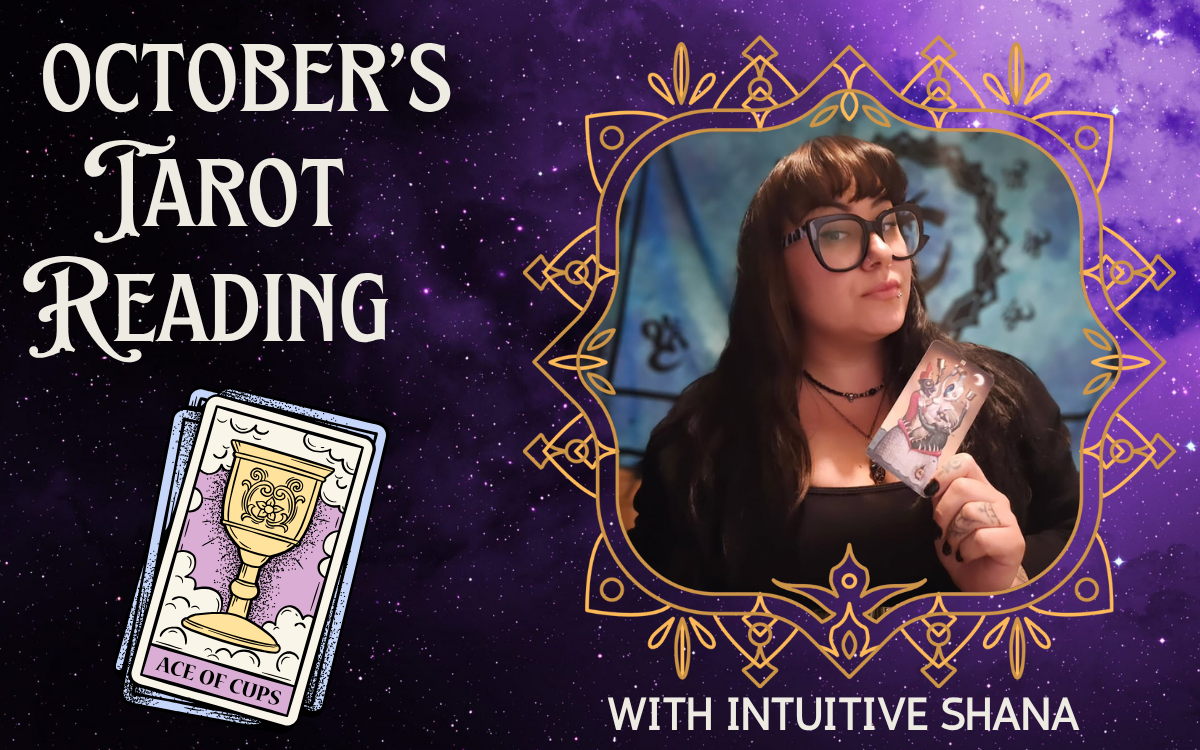
It’s October, which means it’s officially spooky season! The spirit of Halloween and our ancestors will be all around us this month as we indulge in our macabre senses by attending a seance, getting a reading to communicate with our ancestors, or party it up in WeHo in your costume (what little there may or may not be of it). We’re in LA, so we don’t get the luxury of sweater weather or beautiful fall leaves, but we do get to be in a city full of art and magic nonetheless.
Spirit is speaking to us, and it’s not just our ancestors; it’s our own spirit, and it’s asking us to look at what has made us feel good and accomplished and asking how we are planning to bring more of that energy in. In the last few weeks, we have had a realization of what we’re good at, what we enjoy doing, and in some cases, we even got a taste of the spotlight, and we’re feeling pretty good. These insights and experiences are Spirit’s way of guiding us down a more beneficial path; it’s just up to us to decide to take it and navigate it from here. For those of you who are looking at this as an opportunity to create new game plans or life changes, I caution you to remember that the changes you ponder and put into effect now will be challenged as the rest of the year plays out. Don’t get discouraged, stick to your dreams and your plans. If you commit to this, you will see these things have a long shelf life and will be a big part of your life for the next few years.
Some of you may be feeling the spooky vibes in the October air and want to get more in touch with your spiritual side. You don’t have to look that far. First of all, we’re in LA, everybody is discovering their witchy side – crystals, spell candles, readings…whatever occult-esque things you can think of, I can almost guarantee there is someone you know that’s doing it…like me! But you don’t need to limit yourself to a visit to your favorite witch; you already have a little bit of magic in you. Embrace your creativity and imagination, and let your cynical side take a rest for a second. You’re never going to be able to decipher messages from spirit when your logic is constantly shutting you down. Do a guided meditation, get familiar with working with a pendulum, or get your inner circle of folks together for a seance to honor your ancestors. You might be surprised by the information you come up with. Remember, magic and psychic ability are like a muscle—the more you exercise them, the stronger they get.
I think our community as a whole has been trying to stay strong and vigilant for ourselves and the ones around us that we love. In recent times, it seems more challenging than ever to stay up to date on community and world happenings while not feeling the urge to spontaneously combust every time we hear more “breaking news.” I know we feel tired, I know we feel scared and angry. We are being guided to take this energy and transmute it, shape shift it! Do not let these feelings suggest that you are small or weak; take these feelings and change them into a strong, reinforcing energy. Turn to your brothers and sisters when you need a boost, share with them your words of encouragement and guidance. Allow yourself to be the person to hold space, as well as grant yourself permission to ask for it. We are not alone, we are strong together.
I leave you with this witchy advice…We are in the throes of the season of the witch. The veil between worlds thins, our third eyes begin to expand, and as we stand in the closing months of 2025, we yearn for the guidance of our ancestors and ascended masters. We ask them – those who not only came before but paved the path we are walking, oftentimes with far fewer rights or resources than we have now – to be our protectors and nurturers. If you allow your spirit a moment of stillness, you will feel their embrace, love, and wisdom. It is important for us to honor them in turn. Make their favorite foods, leave a space for them at our tables, light candles in their honor, and, more importantly, speak their names and stories so that their memories may never die.
Shana is an initiated priestess, paranormal investigator, author, and host of the podcast Queer from the Other Side. Follow Shana on IG.
Books
Richard E. Cytowic explores complicated relationship with father in new book
‘The Magician’s Accomplice’ touches on camp, ‘80s gay D.C., alcoholism
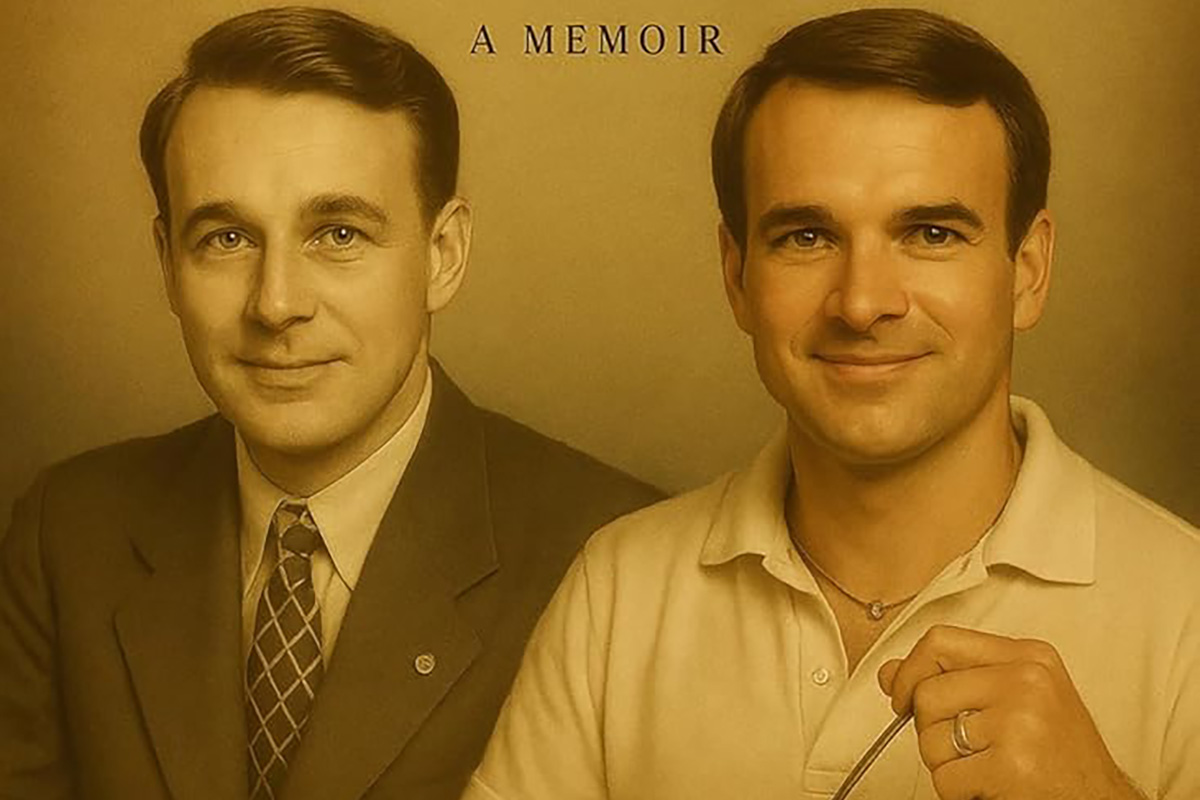
Richard E. Cytowic, neurology professor at George Washington University, has written a memoir, “The Magician’s Accomplice: My Father and I in the Age of Anxiety,” about his complicated relationship with his father, Edmund R. Cytowic. “Big Ed,” also a doctor, was a larger-than-life figure who molded his family into a perfect image while hiding his drinking and drug use. In an interview edited for clarity, Dr. Cytowic spoke about magic as metaphor, memories, and gay life in D.C.

BLADE: What was your inspiration for writing this memoir?
RICHARD CYTOWIC: It was something I felt I had to do. If I didn’t write it, I would go crazy. And it’s taken me about 10 years. It’s gone through many iterations. The first version started with my first day at Duke and had a dual narrative with myself as a young man, stumbling about making mistakes, and the older, wiser neurologist looking back on his younger self and commenting on it. That didn’t work out, but I realized the story was really about my father and me and our dynamic, how he shaped me to be just like him. At the time, I didn’t realize, because, when you’re too close to the material, you can’t see it for what it is. My sister’s observation in the memoir’s opening line, “Come hell or high water, you were going to be a doctor like him,” captures all my memories of him. And I am, I was.
BLADE: The interpretations you give some of your memories are striking. For instance, your family dancing onstage at a Liberace concert. From the outside it feels charming, yet there’s pain there.
CYTOWIC: It is an amusing anecdote. But it’s also sad because it shows we were all performers. We got up on stage effortlessly, we all knew our lines. We knew what to do, how to pose in front of 4,000 people, because we were Big Ed’s puppets for many years. And we just thought it was quite natural to perform because we had been doing this all our lives.
BLADE: It’s striking how in that moment you saw yourself becoming a monster like your father, trying to be the center of attention. You told Liberace, “I have a piece ready to play if you want.”
CYTOWIC: And he said, “This is my show, Richard.” He saw that even at 10 years old, I was trying to take over the center stage. But that’s what we were taught. We were supposed to shine and perform and just be charming, in a way that made us totally false. My impetus for this memoir was to try to understand Big Ed. For stories like this where you have an alcoholic father out of control, it’s so easy for everybody to say, “Oh, my God, I hate him, I can’t stand him.” What I call “You son of a bitch, look what you did to me” stories, those are the easiest stories in the world to tell. But it doesn’t tell anything about the monster, so you have to ask: Was the monster hurt or lonely? Why did he act that way? What made him the way he was? Was there some original wound that he was acting out on himself? So, in the end, instead of a “You son of a bitch” story, it’s really a love story to Big Ed, trying to show some compassion to him and understanding what sort of creature he was.
BLADE: At one point you describe him as high camp. I wonder if you if you ever thought that he might have been gay or bisexual, if deeply closeted?
CYTOWIC: I wonder that too. I don’t have any proof one way or the other, but he certainly was sexually very outspoken. He had all those nude orgy parties and took pictures all the time. I’m sure that goes on all the time now in D.C., but back then, it must have been very unusual. The fact that he could convince people to take part in all that, have them dress up in costumes and pose for pictures, you just have to laugh and think, wow, what a force of nature he was. And mentioning camp, he was camp in the sense of Susan Sontag’s definition, which is a singular incandescent figure who is one thing, an exaggeration, and that was him. He instilled in me a taste for the offbeat and the unusual. If something was normal, I wasn’t interested, but if it was a little off, that was attractive.
BLADE: You mention being drawn to camp figures like Auntie Mame and Liberace.
CYTOWIC: When I saw “Auntie Mame” at Radio City Music Hall, I was in the first grade, so I was five years old. I loved that movie so much because all that craziness was so familiar. Patrick making drinks in the morning, I did that. And my classmates and peers didn’t do anything like that, though it took a while to realize what an unusual life we were living, my mother, sister, and I with Big Ed.
BLADE: The theme of magic and magic tricks runs through the book, which connects so much of life with your father and even your life outside.
CYTOWIC: Magic is a real through line, because two things were prominent with Big Ed. One was the cameras. He had tons of cameras, and the other was the magic, which he did constantly. So would I. When we went to the lake in the summer, I would entertain neighbors and guests by putting on a big magic show. I even made up my own trick. As I say, magic is about telling people you’re going to fool them and then fooling them. Having them know what they’re seeing isn’t possible, and yet they believe it.
BLADE: It feels like such a perfect metaphor for your family.
CYTOWIC: It’s the spectator’s ability to hold two different, contradictory perspectives at the same time. That’s what we did. On the outside, we were a lovely family, everybody would compliment us when we went out to dinner. Back then, with children in restaurants, everybody said, “Oh my god, they’re going to start screaming and running around,” and we were the opposite. My sister and I were dressed up, I had a little coat and clip-on tie. We cleaned our plates, which my father really liked. And then people would come over and compliment my parents on what lovely children they had. Even the proprietor would say, “Doc, your kids are welcome here anytime.” We went against expectations. Here’s this picture perfect little family, so sweet and lovable, and yet behind the scenes, it was absolute chaos. That was the magic, the illusion that we were this lovely family on the surface, while behind the scenes, all hell was breaking loose.
My sister to this day still hates my father. Every time we talk about him, she says, “I hated him. I couldn’t get out of the house fast enough.” She’s frozen in her perspective, and I went instead and looked, to find out who he was, what made him kick? Why was he this way? How did he make me the way I am? And how did I emerge with my own personality? Also, in turning away from the “You son of a bitch” kind of approach and moving to one of trying to understand him, that’s the magic trick that that brings him back, like the dove that’s hidden, and then you produce some silk scarves and, abracadabra, the dove reappears again, all whole.
BLADE: Your descriptions of gay life in D.C. during the ‘80s are fascinating. What’s been the biggest change in that world nowadays?
CYTOWIC: When I came to D.C., you really couldn’t be out in a broad sort of way. So you cultivated a circle of friends, you learned to entertain and throw parties, you did fabulous things. There was a lot more cohesiveness in this world because we all protected one another. I was out but I didn’t make a big deal of it. And it was only when I interviewed for the position of chief resident of Neurology at GW, that it became well-known. I kept meeting people through the process, including David, a psychiatrist who was training to get his neurology certification. I went to his place and talked some more and felt so comfortable talking to him. He mentioned he and the woman he was seeing were going out that night and asked, “You want me to get a date for you?” I said, “Well, David, that’s very nice. Thank you, but I’m gay.” I didn’t realize that he would tell everybody so that when I finally accepted the job and showed up, everybody knew already that I was gay. It helped that there was a physician, an assistant Dean, in the department who was also gay. So we were naturally sympathetic to one another and he was very helpful. It really helped, too, that GW was, and still is, the gayest medical school in the country. If a student at another medical school had problems because he was gay, being bullied, he would transfer to GW. It became a magnet for medical students all over the country. Also, I remember thinking, I’m six blocks from the White House. It doesn’t get any better. At that time, D.C. was a very gay city, so it was easy to make friends and pick up tricks or whatever I wanted to do.
The cell phone has ruined so much because you can’t get people to commit to anything. Instead of saying, “Let’s have dinner next Tuesday at 7:30,” they say, “Well, I don’t know what I might be doing. Something better might come along.” I don’t how people socialize anymore because it’s all so last minute. It drives me crazy. I used to throw sex parties in the ‘90s. I called them “office parties” because they were in my office. I took over from a group that socialized first, starting with drinks and hors d’oeuvres, and then they announced, “time to take off your clothes.” And I said, “No, you cannot mix a social setting with a sexual setting. It doesn’t work like that.” I took over, and set strict rules, one being, everybody arrives at the same time. You’ve got to be here between 8 and 8:15, or else the door is locked, and you’re not getting in. Because so many other parties had people showing up two hours after it started, when things got hot. If you make things hot from the get go, then everybody has a really good time. Now, I don’t know what people do. I’m out of the loop. My orgy days are over.
BLADE: What do you hope readers will take away from “The Magician’s Accomplice?”
CYTOWIC: How to be yourself. I learned how to be myself and not be at the mercy of other people’s expectations. I developed the attitude of, I don’t care what other people think, because their opinion doesn’t affect me one way or the other. So when I write something, I’m not trying to prove a point or convince people. I say, “Here’s what I know. Here’s what I’ve been through. Take a look if you find it useful.” Maybe my experiences will help you.
The Blade may receive commissions from qualifying purchases made via this post.
a&e features
Jennifer Tilly on the legacy of queer neo-noir ‘Bound’ nearly 30 years later: “It was considered detrimental to your career to play a lesbian character”
Tilly also recalls the AIDS epidemic and Project Angel Food’s crucial work.
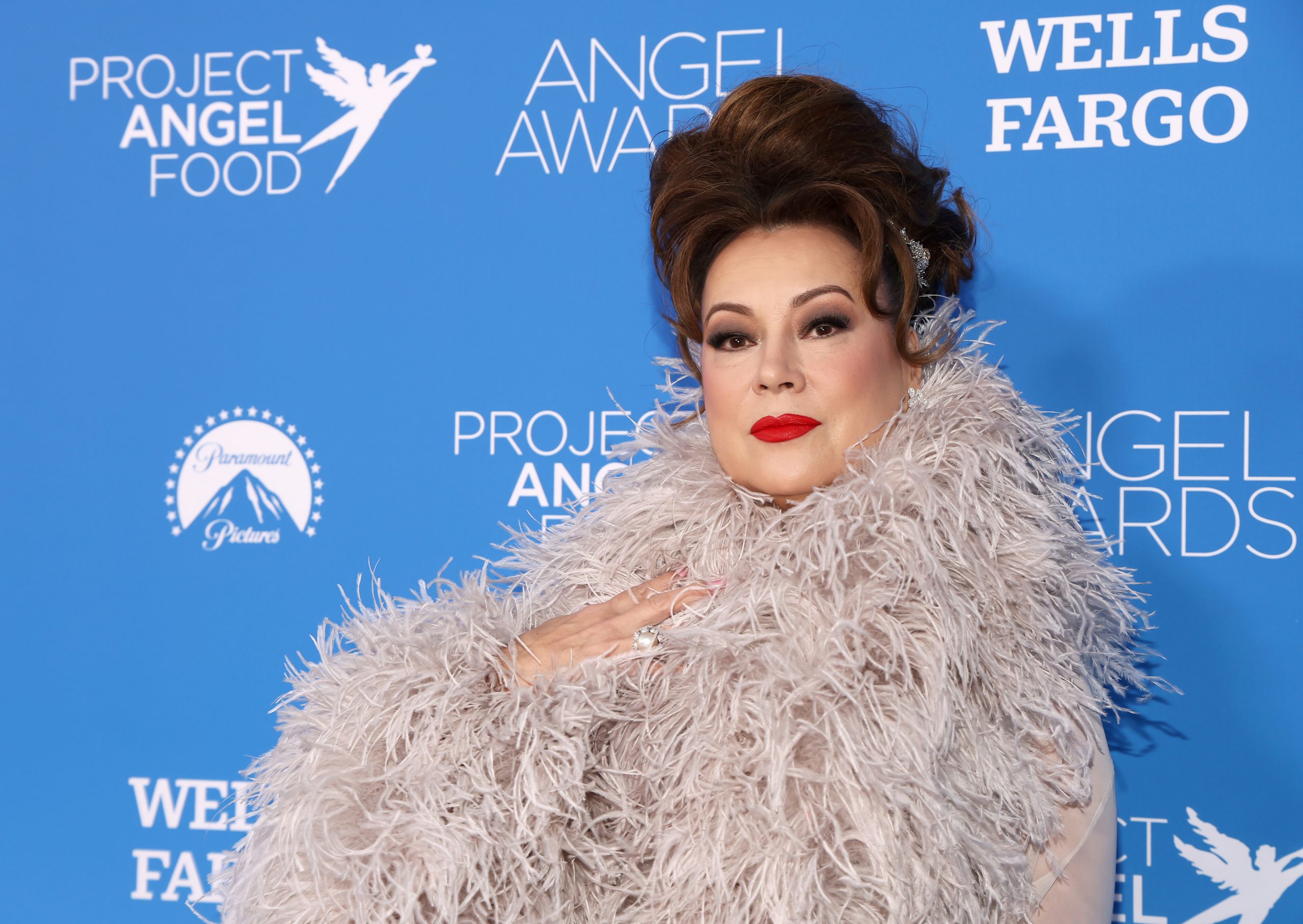
Before accepting the top honor at this year’s Project Angel Food’s Angel Awards, Oscar-nominated and GLAAD award-winning actor Jennifer Tilly (Bullets Over Broadway) reflected on the lasting influence of the 1996 queer neo-noir Bound, which she starred in alongside Gina Gershon (Showgirls).
“When we went in, they said to us, ‘You will not believe the actresses who refused to come in and read’ because it was considered detrimental to your career to play a lesbian character,” Tilly told The Blade on the Sept. 27 red carpet at Paramount Studios in Los Angeles. “But I was astonished because I thought, ‘This is the best script that I’ve read in such a long time with one of the best roles for women.’”
Tilly and Gershon co-starred as two women who fall in love and concoct a scheme to steal millions of dollars in mob money, and the film was directed by the Wachowski Sisters before they became household names. “They were first-time directors — nobody knew anything about them,” Tilly said. “But it’s one of my favorite performances of all time, and I’m really happy the new generation is beginning to discover it. It’s been on a lot of lists of the best film noir, the best lesbian movies.”
The Wachowskis came out as trans decades later, in 2012 and 2016, respectively. While Tilly recalls being surprised, when she reflects on her time working with them, she claims she should’ve known: “They wrote two of the most brilliant parts for women that I’ve ever read. So they had that soul, that heart and sensibility. And then after they did The Matrix and became global superstars. They’re so talented, and I’m always happy to see films that they have created.”
Tilly being recognized with the Angel Award is a full-circle moment, as she has been a supporter of the L.A.-based organization since the ‘90s. Past recipients include Elizabeth Taylor, Sharon Stone, and Jamie Lee Curtis, just to name a few.
“I was just so touched and honored and thrilled because I have been working with them for over 30 years, but I never really thought that I would get an award like this because there are so many people that work for them,” Tilly said. “They have a lot of support from the celebrity community.”
When Project Angel Food was founded in 1989 by Marianne Williamson, the organization started out delivering food to people affected by HIV/AIDS. Tilly recalls that time in the world and the impact the charity made.
“I mean, we were all losing friends. People didn’t understand a lot about AIDS, so people afflicted with the disease were a little bit pariahs because people were afraid,” Tilly said. “So the idea of having a charity that delivers food to these people who are housebound — they’re not only delivering nourishment or physical sustenance, they’re also delivering emotional sustenance. Because for some of these people, the food delivery people are maybe the only people they see all week.”
Arts & Entertainment
New exhibition unveils archival records and forgotten stories of HIV/AIDS activists
“The Sky is Always Falling” intertwines past and present cycles of queer crises and fights for freedom
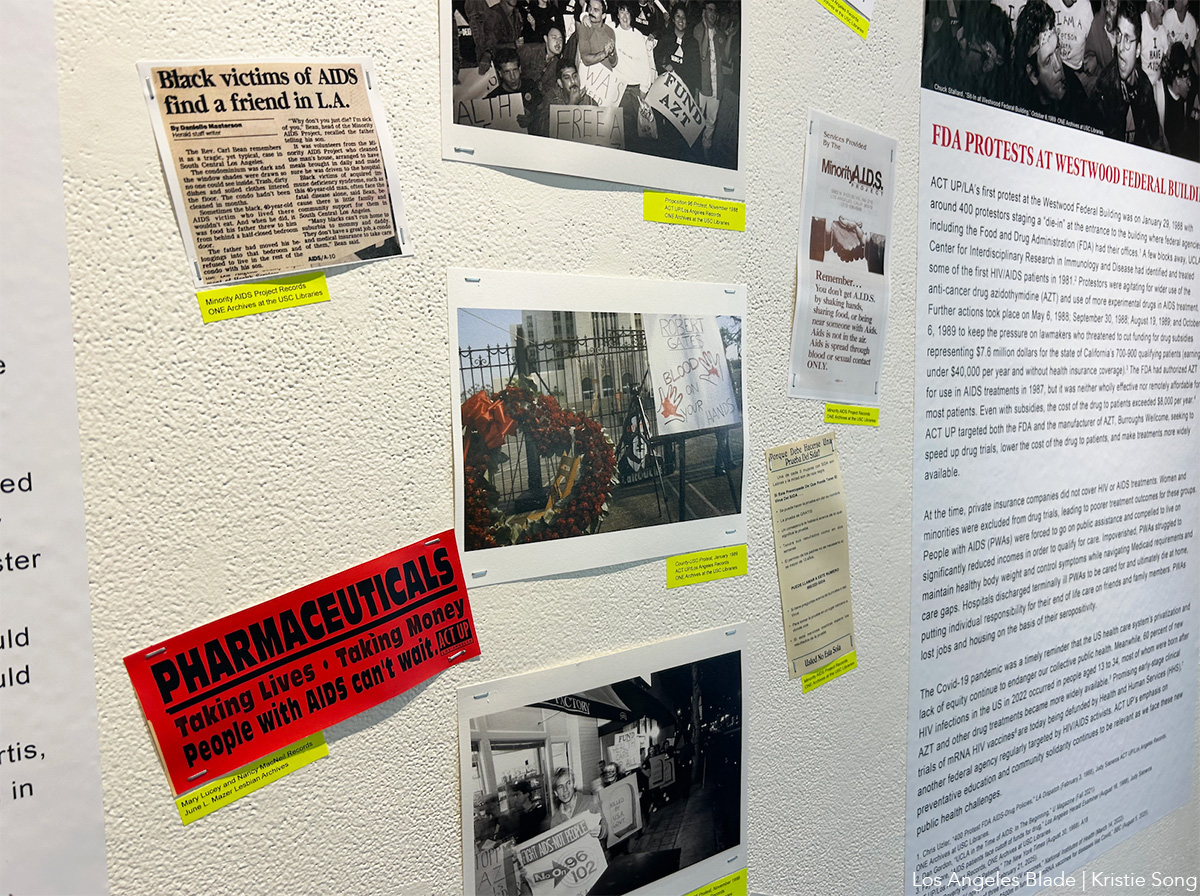
On Wednesday afternoon, art critic and curator Anuradha Vikram strode across the wide main room of the Advocate and Gochis Galleries at the Los Angeles LGBT Center, pressing neon labels onto walls covered with newspaper clippings, pamphlet pages, protest photos and flyer printouts from the peak of the national AIDS epidemic that began in the early 1980s.
These documents hold fragments of the lives of artists, activists and supporters of the AIDS Coalition To Unleash Power/Los Angeles (ACT UP/LA), a group that organized various non-violent protests, community meetings, vigils and other demonstrations to bring attention to harmful and ineffective government policies around HIV/AIDS; advocate for better healthcare access, hospital conditions and resources for PWAs (people with AIDS); and shine light on communities who were sidelined in HIV/AIDS research and care, including women, incarcerated people, and communities of color.
“The Sky is Always Falling: HIV/AIDS Activists Unleashing Power in Los Angeles Then and Now” is a new exhibition opening on September 28th that preserves tangible records of ACT UP/LA’s existence and resistance. Much of the media included in this show is a remnant from when the group was active, from its formation in 1987 to its eventual disintegration in the late 1990s. The various pieces on display are reproductions of historical files and records collected and preserved at institutions like the ONE Archives and the June L. Mazer Lesbian Archives, two major repositories for LGBTQ+ historical materials.
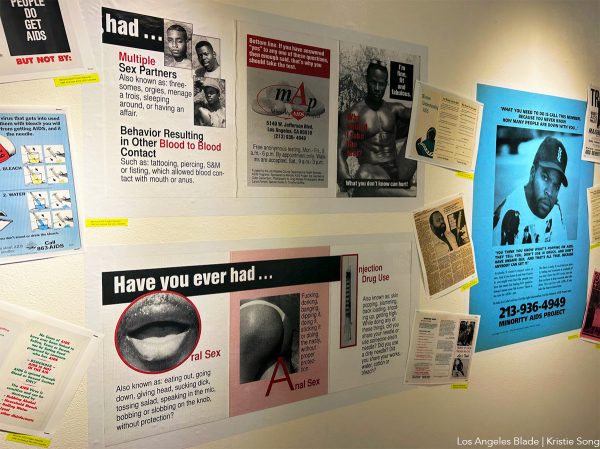
“Since this is primarily focused on the 1980s and ‘90s, so much of the material was printouts, faxes, photocopies, and computer graphic design setups. Reproducing it all made material sense,” Vikram told the Blade.
“If this was a show about the 1940’s or the 1890’s, it might not feel so authentic to have copies of things. But here, even the original materials were copies at one time, so they’re the copies that survived. We’re working with the idea of the copy being the original — which is a very 90’s kind of zine, community-organizing approach that also then applies here for ACT/UP.”
Since April, Vikram has been planning, researching and organizing the exhibition as part of the local Circa: Queer Histories Festival. Now in its third year, Circa was created by One Institute, a long-standing LGBTQ+ organization that amplifies queer histories through educational programming. Their festival runs through October 31st, and includes a panel on the history of sex work in NYC ballroom culture, a South Asian dance and drag performance, a workshop on trans history and reclaiming origin stories, a screening of 1972 Japanese “pink film” Shinjuku Midnight Story: Man and Woman, and several other lectures, readings, and gatherings.
“The Sky is Always Falling” is the opening event of Circa’s packed calendar this year, and offers attendees a chance to become part of an intergenerational conversation around queer solidarity in the face of public health, social, and political crises. The show highlights key actions organized by ACT UP/LA members, including a 1990 protest at Frontera women’s prison that was organized by the coalition’s Women’s Caucus. Over a hundred supporters protested the prison’s handling of its AIDS ward, criticizing its lack of proper nutrition, care, and qualified staff.
In June of 2020, an urgent memo was released by public health experts, stating that San Quentin California State Prison was being impacted by a rapidly developing COVID-19 outbreak and had “profoundly inadequate resources to keep it from developing into a full-blown local epidemic.”
Vikram says it is important to highlight how systemic issues and failures create cycles of violence for marginalized populations. “These issues haven’t gone away in any way. They’ve just kind of rolled forward,” Vikram said. “In each of these topics and panels, the goal was to connect it, ultimately, to something today. So you would understand that it’s not just a historical phenomenon, but rather like a guide, a little bit of a roadmap for how to deal with stuff now.”
A self-proclaimed “baby teenager” during the height of ACT UP activations, Vikram is grateful to the queer elders who welcomed her into their spaces and shared their stories with her. These connections informed her own journey as a queer South Asian person growing up in New York, carving out a space for her own voice and identity in contemporary art criticism and curating.
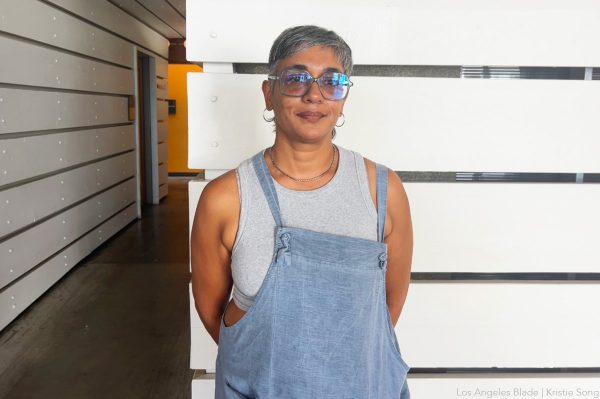
Vikram hopes that — through this exhibition, her lecturing, and her community work — she can “repair” ties between queer adolescents today and queer people of older generations. The knowledge, guidance, and joy she received from relationships she formed with older queer people in her youth provided a model with which she could navigate the world: with fervor and with bravery.
“Now I feel that young people really have very little connection to elder generations — even middle generations like mine. And so that knowledge is not being continuously passed on in the same way,” Vikram said. “This is actually what anthropologists say makes us human: the ability to have that intergenerational transfer of knowledge without having to fight the same battles every generation. And, at this moment in time, that’s being severed because of the fascist turn in our culture, really. So the goal of this project was to help young people who are trying now to organize around a number of issues against this government — for gay rights, for trans rights, for Palestine, for their own health and welfare — to help them get that information in some form.”
“The Sky is Always Falling” opens on Sunday, September 28th with a reception from 4-7 p.m. at the Advocate and Gochis Galleries at the Los Angeles LBGT Center.
Arts & Entertainment
Pride Under the Pines in Idyllwild continues for its 5th year, despite social media backlash
Pride Under the Pines, founded by couple Jeremy Taylor and Niels Kosman, continues on October 4th with live performances, drag, activism, and fellowship

Within Riverside County, in the San Jacinto Mountains, lies the charming community of Idyllwild, known for its beautiful scenery, artistic vibe, and recreational activities. Located just an hour from Palm Springs, it also boasts a growing LGBTQ contingency.
Idyllwild captured the hearts of couple Jeremy Taylor and Niels Kosman, the owners of PS Homeboys, one of Palm Springs’ top interior design and art boutiques. Frequent visitors to Idyllwild, Taylor and Kosman began to wonder why the town never held its own Pride. Taking matters into their own hands and partnering with business owners in the city, Pride Under the Pines debuted on October 23rd, 2021, with over 800 attendees.
Not only was the event a success in terms of LGBTQ representation for the community, but local businesses reported a boom in sales and customers. Pride Under the Pines has since become one of the most anticipated Idyllwild events of the year.
This year, the event celebrates its 5th year with a bang, turning up the glam. The day’s festivities will feature headliners Janice Robinson (“Dreamer”, “There Must Be Love”) and West Hollywood’s Prince Joshua, go-go studs, DJ Galaxy (courtesy of KGay), Congressman Candidate Brandon Riker, and community health partners, with a drag line-up that includes Mayhem Miller, Violeta, and Abigail Beverly Hillz. Los Angeles Blade publisher Alexander Rodriguez will serve as the day’s emcee.
This year continues ahead, full force, despite social media backlash for the event’s signage, hanging smack dab in the center of town. Pride Under the Pines founders Taylor and Kosman are unwavering in their mission to bring queer representation to “The Hill.” They chatted with us as they put the final touches on next week’s programming.
What was the inspiration behind creating Pride Under the Pines?
We wanted to create something truly grassroots and community-driven—a Pride that felt intimate, authentic, and rooted in love. Idyllwild is a magical mountain town that has always embraced diversity, and we thought it was the perfect setting to bring people together in celebration of LGBTQ+ pride, visibility, and joy. We were the first Pride Festival since the pandemic, and it all started when we used Idyllwild as our lockdown escape. We fell in love with the town and its community. Through conversations, we learned there is a large LGBTQ community that also feels the need to be heard and seen. This Pride was started to shine a bright light on the local queer community and to bring awareness to everyone else.
What makes Pride Under the Pines different than other Prides?
Unlike many large-scale city Prides, this event has an intimate, small-town charm. You’re surrounded by nature, pine trees, and a community that genuinely rallies together. It’s not about corporate floats—it’s about neighbors, friends, and allies lifting each other up. That balance of heart, inclusivity, and stunning mountain setting makes it truly one-of-a-kind.
What is your mission in producing Pride Under the Pines?
Our mission is to create a safe, joyful, and visible space where the LGBTQ+ community and our allies can come together. We want to celebrate diversity, promote equality, and strengthen connections in a way that uplifts both the queer community and the town of Idyllwild.
What have been some of your biggest challenges in establishing this event over the years?
Permitting, logistics, and funding have always been challenges for grassroots organizers like us. Each year, we navigate county regulations, rising costs, and unexpected hurdles. And of course, building something from scratch in a small town takes time and persistence. But the love we receive from attendees makes every obstacle worth it.
What have you loved most about working on this project?
The connections. Seeing people who’ve never been to Idyllwild fall in love with the town. Watching LGBTQ+ youth feel seen. Hearing allies say this is their favorite event of the year. And, most of all, the joy of building something meaningful together as a couple, a team, and a community.
What can we expect from this year?
Our 5th anniversary is the biggest yet! A brand-new location at the Idyllwild Town Hall, incredible headliners like Janice Robinson, fabulous drag performances, DJs, live music, a beer garden, delicious food, and a VIP experience with open bar and meet-and-greets. It’s going to feel like a full festival while still keeping that warm community spirit.
Your sign is in the middle of town. Why is it so important to grow visibility in today’s climate?
Visibility saves lives. At a time when LGBTQ+ rights are under attack nationwide, putting a Pride banner in the center of town says: We are here, we are proud, and we are part of this community. It’s a statement of resilience and hope—for queer people in Idyllwild, for visitors, and for anyone driving by who needs to feel seen.
You have received hateful social media comments. How does that make you feel? What is your first reaction?
Of course, it stings—but more than anything, it strengthens our resolve. Hate is loud, but love is louder. Our first reaction is to lean on our allies, our friends, and the outpouring of positivity that always follows.
Did you ever consider cancelling Pride because of hateful comments? What makes you continue to put it on?
Never. If anything, the hate shows exactly why this Pride is needed. We continue because the LGBTQ+ community deserves visibility, joy, and safety in every town—not just the big cities. We continue because love is stronger than hate.
What do you want to say to those who want you to shut down Pride Under the Pines?
We’d say this: Pride isn’t about you. It’s about love, equality, and visibility for people who have historically been silenced. No amount of hate will stop us from celebrating who we are.
On a fun note, how did you two meet, and how long have you been together?
We met years ago in Palm Springs—two creatives who bonded over design, humor, and a shared love for community. We’ve been together for over a decade, and every year just gets better.
You also own and run your business together. How do you maintain a healthy relationship while working so hard together and putting on events?
We laugh. A lot. We balance each other’s strengths and give each other space when needed. We’ve learned how to divide and conquer, but also when to come together. At the end of the day, we love what we do and we love each other—that makes even the hard days easier. We say if you can run a business together and produce a Gay Pride for 5 consecutive years, we must be doing something right.
What do you love most about the queer community in the Coachella Valley?
The diversity and resilience. Our community here is vibrant, creative, and unapologetically itself. Whether in Palm Springs, Idyllwild, or beyond, there’s a sense of family that’s deeply inspiring. We all support each other, whether we patronize each other’s business or we lift each other up through conversation and showing up. It is truly an amazing feeling, that sometimes we feel people forget to remember.
What is your message to the community?
Stand proud, stand visible, and stand together. We need each other more than ever. Come to the mountains, celebrate with us, and remember that Pride isn’t just a party—it’s a powerful act of love, resilience, and community.
The event will be held at Idyllwild Townhall / 25925 Cedar St, Idyllwild-Pine Cove, CA 92549
-

 LGBTQ+ RESOURCES4 days ago
LGBTQ+ RESOURCES4 days agoHope on the other side: How Rainbow Railroad rescues LGBTQI+ people at risk around the world
-
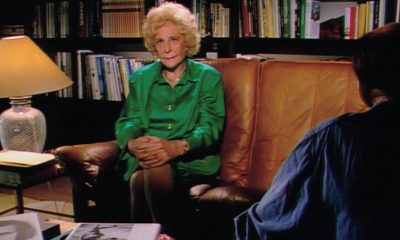
 Movies3 days ago
Movies3 days agoIntensive ‘Riefenstahl’ doc dives deep into a life of denial
-
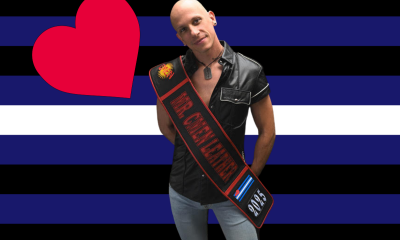
 Features1 day ago
Features1 day agoHarnessing identity: Mr. CMEN Leather 2025 bares his heart and soul
-

 Books3 days ago
Books3 days agoThese four intertwined stories will leave you flabbergasted
-
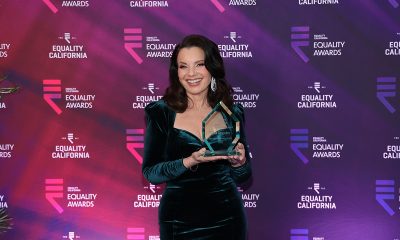
 Events22 hours ago
Events22 hours ago“We are glimmers of hope”: LGBTQ+ advocates deliver powerful speeches defending queer rights at Equality Awards
-
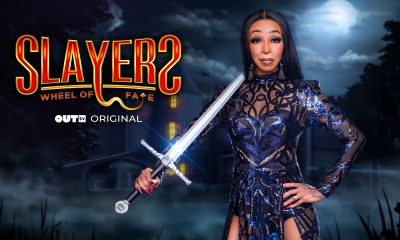
 Miscellaneous1 day ago
Miscellaneous1 day agoTiffany ‘New York’ Pollard Dishes on queer storytelling in her new show ‘Slayers: Wheel of Fate’
-

 National4 hours ago
National4 hours agoLGBTQ rights on the line: What to watch as Supreme Court’s new term begins
-
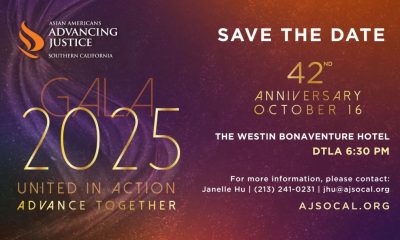
 Events2 hours ago
Events2 hours agoThe Los Angeles Blade Partners with AJSOCAL to host gala uplifting AAPI joy and resistance



